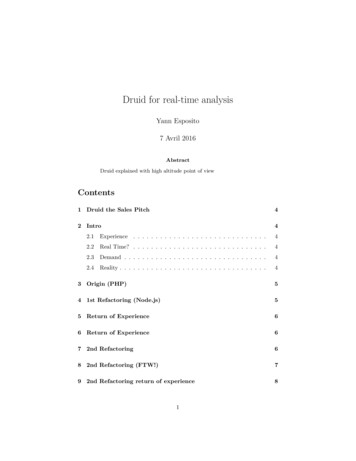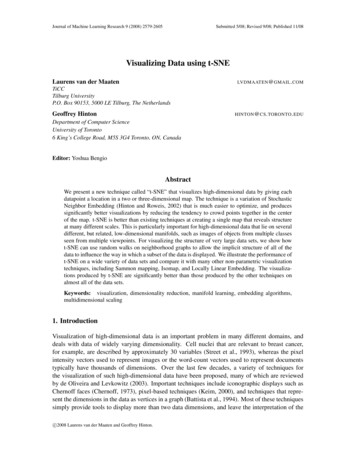
Transcription
Linux FirewallsFrank Kuse, AfNOG 20171 / 30
About this presentationBased on a previous talk by Kevin Chege and Chris Wilson, with thanks!You can access this presentation at:Online: http://afnog.github.io/sse/firewalls/Local: ndex.htmlGithub: s/presentation.mdDownload ls/presentation.pdfDownload Exercises: xercises.pdf2 / 30
What is a Firewall?3 / 30
Advanced FirewallsBasic firewalls are packet filtersCan't always make a decision based on one packet (examples?)Stateful firewalls (connection table)Application layer (L7) filtering/inspection/IDSRedundant firewalls with synchronisationVPNs and SSL "VPNs"4 / 30
Stateful Firewallsunusual eventclient/receiver pathserver/sender path﴿Step 2 of the 3 way handshake﴾SYN/SYN ACKCONNECT/ SYN ﴿Step 1 of the 3 way 5 / 30
Limitations of Firewalls6 / 30
Blocking Websites7 / 30
What do firewalls filter?8 / 30
Typical featuresRulesets (lists of rules, read in order)Rules (IF this THEN that)Match conditionsinterface, IP address, protocol, port, time, contentsActionsaccept, drop, reject, jump to another table, returnDefault policy9 / 30
iptables/netfilter10 / 30
Listing current rulesWe use theiptablescommand to interact with the firewall (in the kernel): sudo apt install iptables sudo iptables -L -nvChain INPUT (policy ACCEPT 119 packets, 30860 bytes)pkts bytes targetprot opt inoutsourcedestinationChain FORWARD (policy ACCEPT 0 packets, 0 bytes)pkts bytes targetprot opt inoutsourcedestinationChain OUTPUT (policy ACCEPT 36 packets, 1980 bytes)pkts bytes targetprot opt inoutsourcedestination11 / 30
Your first rulesetConfigure your firewall to allow ICMP packets. sudo iptables -A INPUT -p icmp -j ACCEPT sudo iptables -L INPUT -nvChain INPUT (policy ACCEPT 4 packets, 520 bytes)pkts bytes targetprot opt inoutsourceicmp --*0.0.0.0/0destination00 ACCEPT0.0.0.0/0*What effect will this have?What are the numbers?12 / 30
Testing rulesHow can you test it? ping -c4 127.0.0.1PING 127.0.0.1 (127.0.0.1) 56(84) bytes of data.64 bytes from 127.0.0.1: icmp seq 1 ttl 64 time 0.058 ms. sudo iptables -L INPUT -nvChain INPUT (policy ACCEPT 220 packets, 218K bytes)pkts bytes targetdestination8672 ACCEPT0.0.0.0/0prot opt inoutsourceicmp --*0.0.0.0/0*Why do we see 8 packets against the rule, instead of 4?You can useiptables -L INPUT -nZtoZ erothe counters.13 / 30
Blocking pingsAdd another rule: sudo iptables -A INPUT -p icmp -j DROP sudo iptables -L INPUT -nvChain INPUT (policy ACCEPT 12 packets, 1560 bytes)pkts bytes targetprot opt inoutsourceicmp --**0.0.0.0/0icmp --**0.0.0.0/0destination8672 ACCEPT0.0.0.0/000 DROP0.0.0.0/0 ping -c1 127.0.0.164 bytes from 127.0.0.1: icmp seq 1 ttl 64 time 0.067 msIs that what you expected?14 / 30
Rule precedenceInsert a DROP rule before the ACCEPT rule with-I : sudo iptables -I INPUT -p icmp -j DROP sudo iptables -L INPUT -nvChain INPUT (policy ACCEPT 12 packets, 1560 bytes)pkts bytes targetprot opt inoutsourceicmp --**0.0.0.0/0icmp --**0.0.0.0/0icmp --**0.0.0.0/0destination00 DROP0.0.0.0/010840 ACCEPT0.0.0.0/000 DROP0.0.0.0/015 / 30
Rule precedence testing ping -c1 127.0.0.1PING 127.0.0.1 (127.0.0.1) 56(84) bytes of data. C--- 127.0.0.1 ping statistics --1 packets transmitted, 0 received, 100% packet loss, time 0ms16 / 30
List rules with indexesUse the iptables-L --line-numbersoptions: sudo iptables -L INPUT -nv --line-numbersChain INPUT (policy ACCEPT 15 packets, 1315 bytes)numpkts bytes targetdestinationprot opt inoutsource10 DROPicmp --**0.0.0.0/00 ACCEPTicmp --**0.0.0.0/00 DROPicmp --**0.0.0.0/0200.0.0.0/000.0.0.0/0300.0.0.0/017 / 30
Deleting RulesDelete rule by index: sudo iptables -D INPUT 3Delete rule by target: sudo iptables -D INPUT -p icmp -j ACCEPTCheck the results: sudo iptables -L INPUT -nv --line-numbersChain INPUT (policy ACCEPT 9 packets, 835 bytes)numpkts bytes targetprot opt inoutsourceicmp --*0.0.0.0/0destination100 DROP*0.0.0.0/018 / 30
Persistent RulesWhat happens when you reboot?19 / 30
Persistent RulesWhat happens when you reboot?The rules that we created are only in the kernel's memory. They will be lost onreboot.How can we make them permanent? Could be as simple as:/sbin/iptables-save /etc/default/iptables/sbin/iptables-restore /etc/default/iptablesOr installiptables-persistentwhich automates this a little.20 / 30
Connection TrackingEvery packet is tracked by default (made into a connection).You can see them withconntrack -L :sudo /usr/sbin/conntrack -Ltcp6 431999 ESTABLISHED src 196.200.216.99dst 196.200.219.140 sport 58516 dport 22src 196.200.219.140 dst 196.200.216.99 sport 22 dport 58516[ASSURED] mark 0 use 1What does this mean?21 / 30
Connection Trackingsudo /usr/sbin/conntrack -Ltcp6 431999 ESTABLISHED src 196.200.216.99dst 196.200.219.140 sport 58516 dport 22src 196.200.219.140 dst 196.200.216.99 sport 22 dport 58516[ASSURED] mark 0 use 1ESTABLISHED is the connection stateWhat are valid states?src 196.200.216.99 is the source address of the tracked connectiondst 196.200.219.140 is the destination addressWhich one is the address of this host? Will it always be?sport 58516: source portdport 22: destination portAnother set of addresses: what is this?22 / 30
Connection TrackingHow do we use it?iptables -A INPUT -m state --state ESTABLISHED -j ACCEPTYou normally want this!Can you see any problems?23 / 30
Connection Tracking ProblemsWhat happens if someone hits your server with this?sudo hping3 --faster --rand-source -p 22 196.200.219.140 --synOr if you run a server that has thousands of clients?24 / 30
Connection Tracking ProblemsAdd a rule to block all connection tracking to a particular port:sudo /sbin/iptables -t raw -A PREROUTING -p tcp --dport 22 -jNOTRACKWrite your rules so that connection tracking is not needed (allow traffic bothways).You probably want to do this for your DNS server. How?25 / 30
Connection Tracking ProblemsAdd a rule to block all connection tracking to a particular port:sudo /sbin/iptables -t raw -A PREROUTING -p tcp --dport 22 -jNOTRACKWrite your rules so that connection tracking is not needed (allow traffic bothways).You probably want to do this for your DNS server. How?sudo /sbin/iptables -t raw -A PREROUTING -p udp --dport 53 -jNOTRACK26 / 30
Standard simple rule setThis is one of the first things I set up on any new box:iptables -P INPUT ACCEPTiptables -F INPUTiptables -A INPUT -m state --state ESTABLISHED -j ACCEPTiptables -A INPUT -i lo -j ACCEPTiptables -A INPUT -p icmp --icmp-type echo-request -j ACCEPTiptables -A INPUT -p tcp --dport 22 -j ACCEPTiptables -A INPUT -m limit --limit 5/min -j LOG --log-prefix'Rejected INPUT 'Check that I can access the server without triggering a "Rejected INPUT"message in the logs, and then lock it down:iptables -P INPUT DROP27 / 30
ExerciseInstallnmap :sudo apt install nmapScan your system:sudo nmap -sS pcXX.sse.ws.afnog.orgWhich ports are open?How would you block them?You will probably lock yourself out of your PC. That is OK, we can fix it :)As long as the changes have NOT been made permanent, we can rebootthe system to restore access.28 / 30
ExerciseThe correct answer is:iptables -I INPUT 2 -p tcp --dport 22 -j DROPWhich prevents new connections, but as long as rule 1 allows ESTABLISHEDconnections you will not be locked out (unless you lose your connection).The output ofiptables -L -nvshould look like:Chain INPUT (policy ACCEPT 0 packets, 0 bytes)pkts bytes target prot opt in out source151 11173 ACCEPT alldestination--**0.0.0.0/0 0.0.0.0/0state--**0.0.0.0/0 0.0.0.0/0tcpESTABLISHED00tcpdpt:2229 / 30
FINAny questions?(yeah, right!)30 / 30
Stateful Firewalls (Start) CLOSED LISTEN/ CLOSE/ LISTEN CONNECT/SYN ﴿Step 1 of the 3 way handshake﴾ ﴿Step 2 of the 3 way handshake﴾ SYN/SYN ACK unusual ev











